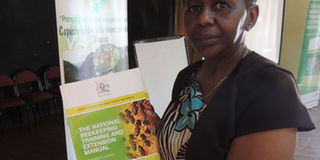Agric ministry publishes guide for beekeeping

caption: Alice Kangave, principal entomologist, Ministry of Agriculture, displays copy of the beekeeping manual. PHOTO BY BRIAN SSENOGA
A manual, which will be used to guide those involved beekeeping as well as help in the training aspect of the business, has been officially launched by Ministry of Agriculture.
At the event, Bright Rwamirama, the state minister, decried the limited exploitation of natural resources in Uganda in spite of the suitable environment and rich biodiversity.
“When you look at the gap between potential and actual production of honey, you can’t help but ask what the problem is,” he said. “The answer is always the same; lack of knowledge and skills.”
But, the minister observed that though apiculture (beekeeping) has had poor performance, the trend is changing and the practice is getting better.
Identify solutions
Uganda has an estimated production potential of 500,000 metric tonnes of honey per year and an annual export potential of 300,000 metric tonnes of honey, which represents 60 per cent. However, it is only 2,600 tonnes, translating to 0.5 per cent, that is produced. Of this, only 1,800 tonnes is of exportable quality.
Against this backdrop, the manual was developed by key sector players led by The Uganda National Apiculture Development Organisation (TUNADO). It was a way to identify solutions to challenges facing the sector.
Simplified
Charity Namala, programme coordinator, TUNADO noted that, “there are still unresolved challenges in the sector including low productivity due to low colonisation of bee hives, poor quality honey on the market due to poor post-harvesting handling, and lack of access to better packaging material among others”
The national beekeeping training and extension manual has the various topics simplified with illustrations on feeding bees, establishing bee forage, populating bee hives, setting up an apiary, basic entrepreneurship tasks, making bee suits and bee hives, among others.
David Kyeyune, project manager, Swiss Contact Uganda, said, “This guide will help us avoid offering conflicting information to bee keepers and others. The manual will be translated into seven local languages for those who cannot read and understand English.”




